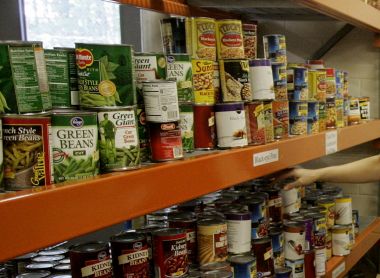Britain's hunger crisis: Bishop of Truro says benefits system doesn't work

The Bishop of Truro, together with a group of cross-party MPs, has criticised the effectiveness the benefits system in a comprehensive report into Britain's hunger crisis released today.
The Feeding Britain report was published by the all-party parliamentary inquiry into hunger and food poverty, led by Labour MP Frank Field and the Bishop of Truro, Tim Thornton, and was compiled with funding from the Archbishop's charitable trust.
The report said that benefit-related problems were the reason most often given for people resorting to a food bank. Problems with the administration of benefits, creating delays or income gaps which create emergency needs were some of the problems cited.
Alongside calling for government-supported food banks and a new public body to manage food poverty, the report's 77 recommendations include suggestions for welfare reform calls for a higher minimum wage in an effort to reduce the number of people needing to use food banks.
The Archbishop of Canterbury, Justin Welby, wrote in the Mail on Sunday to welcome the report and issue a challenge to the government. He commented on the "astonishing" levels of food waste across the UK, and said he had been more surprised by the hunger in Britain than on a recent trip to Congo.
The report was commissioned in light of the growth of food bank use, not just in Britain but in America and Germany as welI. Almost half a million people were referred to a food bank run by the Trussell Trust between April and September this year.
In the report, the Bishop of Truro said it was time to review the role and effectiveness of the welfare state in modern Britain.
"We heard stories and gained first-hand experience that led us to the conclusion that the rise in the use of food banks does indicate a deeper problem in our society; the 'glue' that used to be there is no longer there in many instances," Bishop Tim writes. "It can be described as the commodification process with people seen as commodities, and the transactions between them are regarded simply as the exchanging of products rather than relationships between two human beings."
The report criticises the government's lack of support for food banks, but commends churches for the role they have played in establishing a network of food banks across the country.
"In a country where the church is seen as being in long-term decline, it is the churches through their membership who have brought forward this most extraordinary voluntary welfare development," the report says.
Conservative ministers have been cautious in their response to the inquiry's findings, commending the work of charities, but reluctant to support an increase state intervention.
Matthew Hancock, a Conservative business minister, told Sky News that food bank use had increased because "more people know about them."
Hancock added, "And the amount of people who work in food banks and give up their time, I applaud – I think that's fantastic. But the central question here is how do you tackle these deep-ingrained problems of poverty, and the single best way through that is undoubtedly work."
Director of Church Action on Poverty Rev Dr Keith Hebden today welcomed the report, but added a word of caution in his blog, saying: "There is a danger in this [report] that the voluntary sectors role as 'welfare on the cheap' will be formalised and the hunger crisis we're currently facing will turn into a chronic and acceptable norm."
The report was produced with the support of a number of Christian charities, including Church Action on Poverty, however Hebden does not restrain from pointing out the gaps in the report's recommendations.
"To see the masses of food thrown out by supermarkets as waste that can be utilised by the poor is deeply dehumanising," Hebden writes. "In an emergency – great! – but as a long term strategy: dystopian. Social Supermarkets buy us time and charity but eventually we need justice for the hungry not just crumbs from under the table."
Chris Mould, chairman of the Trussell Trust, the nation's largest food bank network, described Feeding Britain as a seminal report, but said the challenge would be in whether the recommendations are implemented.
In a written response Mould said: "The Inquiry makes it clear that they think it is no good picking and choosing what to tackle. The Trussell Trust would agree: that's precisely how to hollow out the potential and impact of the Inquiry and leave most of the causes of the problem untouched."











